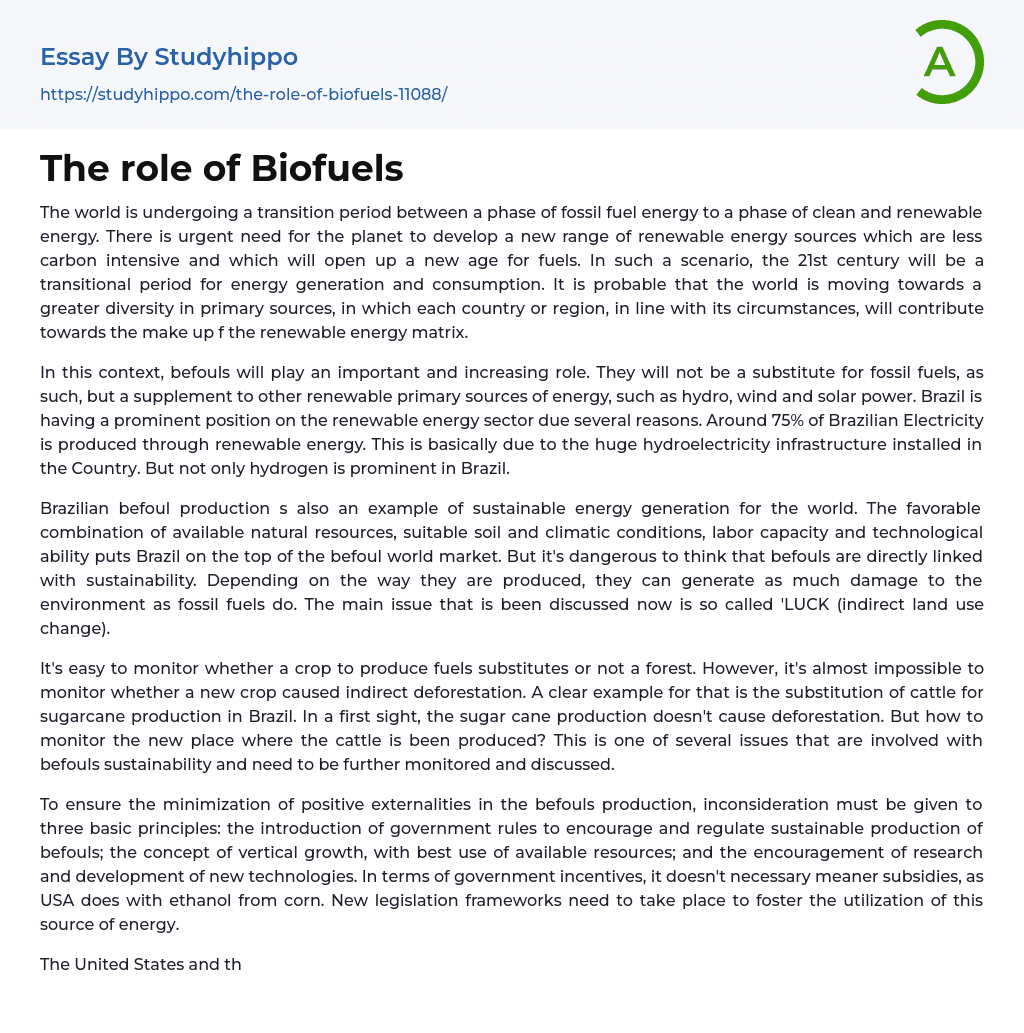The world is currently transitioning from fossil fuel energy to clean and renewable energy. It is crucial for the planet to develop new, less carbon-intensive renewable energy sources, paving the way for a new era of fuels. This transition in energy generation and consumption will occur throughout the 21st century, with each country or region contributing based on their specific circumstances.
In this context, biofuels (befouls) will play an increasingly important role alongside other renewable sources such as hydro, wind, and solar power. Brazil stands out in the renewable energy sector due to its extensive hydroelectric infrastructure, which generates around 75% of its electricity from renewables. Additionally, Brazil's leadership in biofuel production showcases sustainable energy generation worldwide thanks to abundant natural resources, suitable land and climate conditions, skilled labor, and technological aptitude.
However, it is important to acknowledge that depending on their
...production methods, biofuels can have a similar environmental impact as fossil fuels. The current topic under discussion is indirect land use change (LUCK), which refers to monitoring whether cultivating a new crop indirectly leads to deforestation. In Brazil specifically, replacing cattle with sugarcane production has made it challenging to monitor the impact of deforestation.This passage highlights a concern regarding the sustainability of biofuels and identifies three key principles that must be considered to minimize positive externalities in their production. These principles include implementing government regulations and incentives for sustainable production, maximizing available resources through vertical growth, and promoting research and development of new technologies.
It is important to clarify that government incentives do not necessarily refer to subsidies like those provided by the USA for corn-based ethanol. Instead, it calls for establishing new legislative frameworks that
support the use of biofuels as an energy source.
Both the United States and European Union prioritize renewable energy sources and sustainability criteria in their respective development programs (REFS and DIRECTIVE 2009/28/SEC). The passage emphasizes the significance of sustainability criteria, which encompass factors such as food security, working conditions, regional development, social inequality, environmental degradation, and greenhouse gas emissions.
It also underscores that access to energy is recognized as a social right aiming to provide affordable energy with minimal environmental impact for all individuals. In order to maximize output in the biofuel sector given limited availability of natural resources, focusing on vertical growth rather than horizontal expansion is crucial.In order to achieve this objective, it is crucial to incorporate more technology and minimize waste in the production cycle of befouls. The airline industry has the potential to transition from consuming fossil fuels to utilizing befouls as a means of reducing carbon emissions. Currently, this industry is responsible for 2% of global greenhouse gas (GIG) emissions, a number projected to increase to 3% by 2050. In July 2011, the utilization of befouls on commercial airplanes received approval, prompting certain airlines to experiment with its usage. Nonetheless, challenges exist not only in terms of befoul production but also concerning the technology itself. Bodiless fuel that is stored for extended periods can be vulnerable to oxidation at low temperatures, resulting in gelling. There are additives available that can slightly enhance cold weather tolerance of bodiless fuel. Rubber materials containing nitrite expand when exposed to aromatic compounds found in traditional petroleum fuel. However, if pure fuels without any petroleum mixture or paraffin additives come into contact with rubber seals and hoses,
shrinkage may occur. To tackle this issue, aircraft manufacturers have begun employing a synthetic rubber substitute called Vitro for seals and hoses
- John Locke essays
- 9/11 essays
- A Good Teacher essays
- A Healthy Diet essays
- A Modest Proposal essays
- A&P essays
- Academic Achievement essays
- Achievement essays
- Achieving goals essays
- Admission essays
- Advantages And Disadvantages Of Internet essays
- Alcoholic drinks essays
- Ammonia essays
- Analytical essays
- Ancient Olympic Games essays
- APA essays
- Arabian Peninsula essays
- Argument essays
- Argumentative essays
- Art essays
- Atlantic Ocean essays
- Auto-ethnography essays
- Autobiography essays
- Ballad essays
- Batman essays
- Binge Eating essays
- Black Power Movement essays
- Blogger essays
- Body Mass Index essays
- Book I Want a Wife essays
- Boycott essays
- Breastfeeding essays
- Bulimia Nervosa essays
- Business essays
- Business Process essays
- Canterbury essays
- Carbonate essays
- Catalina de Erauso essays
- Cause and Effect essays
- Cesar Chavez essays
- Character Analysis essays
- Chemical Compound essays
- Chemical Element essays
- Chemical Substance essays
- Cherokee essays
- Cherry essays
- Childhood Obesity essays
- Chlorine essays
- Classification essays
- Cognitive Science essays




